Betta fish are not just beautiful; they’re fascinating creatures with specific dietary needs. Ensuring they receive a proper diet is crucial to their health and longevity.
While commercial betta food is the go-to, you might wonder if your betta can eat something from your plate. This curiosity leads many owners to ask: What can betta fish eat of human food?
Betta Fish Dietary Needs
Natural Diet of Betta Fish
In the wild, betta fish are insectivores, primarily feasting on insects and their larvae. This protein-rich diet is what keeps them healthy and vibrant.
Nutritional Requirements of Betta Fish
To thrive, bettas require a diet high in protein with some fat and minimal carbohydrates. Their food should mimic the high-protein diet they would naturally consume in the wild.
Safe Human Foods for Betta Fish
So, what human foods are safe for your betta? Here’s a list:
Vegetables
- Peas: Cooked peas with the outer skin removed are a good occasional treat.
- Lettuce: Soft, leafy greens can be fed, but only in moderation.
- Spinach: High in iron, spinach can be offered in small amounts.
Fruits
- Apple Slices: Thinly sliced apples can be a sweet treat but remove the skin and seeds first.
- Banana: A tiny piece of banana can be given, but it’s best to keep it minimal due to its high sugar content.
- Cucumber: This watery vegetable is safe but should be served in small, manageable pieces.
Protein Sources
- Boiled Egg Yolk: High in protein, boiled egg yolk can be mashed and fed in tiny portions.
- Chicken: Cooked chicken breast, shredded into small pieces, can be offered occasionally.
- Fish Fillet: Unseasoned, cooked fish is another protein-rich option.
How to Prepare Human Food for Betta Fish
Cooking vs. Raw
Always ensure the food is clean, free of seasonings, and cooked where necessary. Raw vegetables should be blanched, and protein sources should be fully cooked to avoid any harmful bacteria.
Cutting Food into Appropriate Sizes
Betta fish have small mouths, so it’s important to cut the food into tiny, bite-sized pieces to prevent choking or overeating.
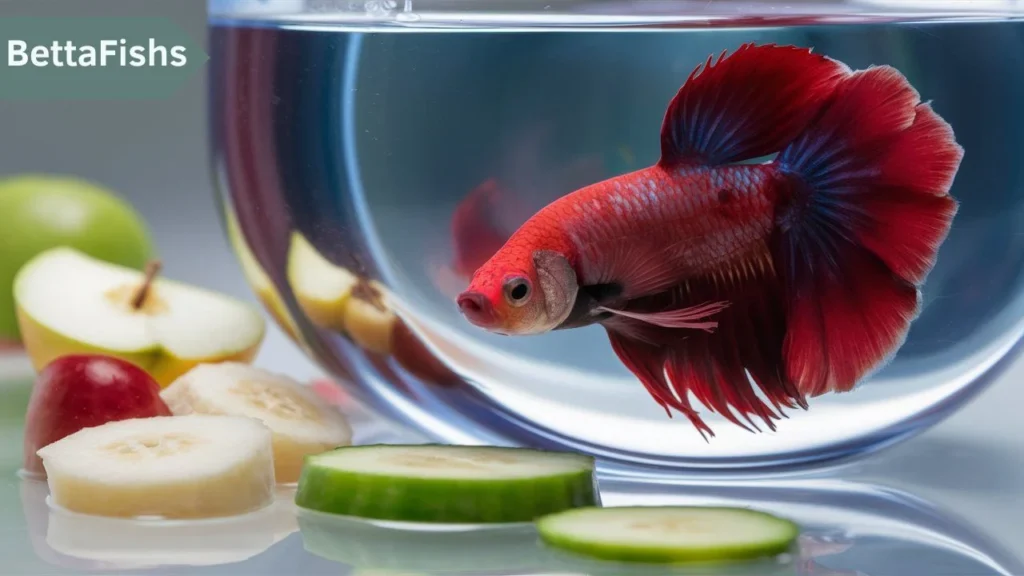
Feeding Frequency and Portion Control
How Often to Feed Betta Fish
Feeding human food should be an occasional treat, not a staple. Once or twice a week is sufficient to add variety without disrupting their main diet.
Portion Sizes
A small piece the size of their eye is an appropriate portion for bettas. Obesity and other health problems can be caused by overfeeding.
Foods to Avoid
Toxic Foods
Avoid foods like chocolate, caffeine, and anything spicy or seasoned. These can be harmful or even fatal to bettas.
Foods That Are Hard to Digest
Stay away from fibrous or starchy foods like potatoes or bread, as they can be difficult for bettas to digest and may cause bloating.
Signs Your Betta Fish Enjoys or Dislikes Human Food
Behavioral Indicators
If your betta eagerly swims to the food and eats it quickly, it’s a good sign they enjoy it. On the other hand, if they spit it out or ignore it, they might not be a fan.
Health Signs
A healthy appetite, vibrant colors, and active behavior are signs that your betta is thriving on its diet. Watch for any changes after introducing new foods.
How to Introduce Human Food to Your Betta Fish’s Diet
Starting Slow
Introduce new foods gradually to ensure your betta doesn’t have a negative reaction. Start with tiny amounts and observe.
Monitoring Reactions
Keep an eye on your betta after feeding new foods. Look out for signs of discomfort, such as bloating or lethargy, which may indicate that the food doesn’t agree with them.
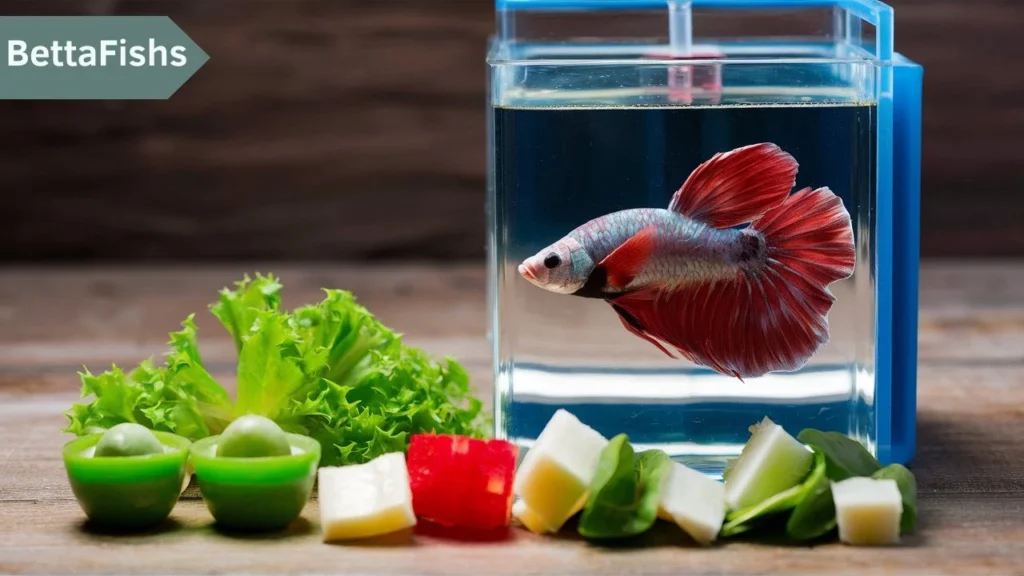
Vegetables That Betta Fish Can Eat
Peas
Peas are excellent for relieving constipation in bettas. Make sure to cook and peel them before serving.
Lettuce
Soft, leafy lettuce can be a good occasional snack. To get rid of any pesticides, make sure you wash well.
Spinach
Spinach is rich in nutrients but should be given in moderation. Too much can cause digestive issues.
Fruits That Betta Fish Can Eat
Apple Slices
Apples should be sliced thin, with skin and seeds removed. They offer a sweet, crunchy treat but should be given sparingly.
Banana
Bananas are high in sugar, so they should only be given as an occasional treat. It’s okay to have a tiny bit occasionally.
Cucumber
Cucumber is mostly water, making it a hydrating snack. However, be sure to remove the skin and offer it in tiny portions.
Protein Sources from Human Food
Boiled Egg Yolk
Rich in protein, boiled egg yolk can be mashed and offered in small quantities. It’s an excellent occasional treat but should not replace their main food.
Chicken
Unseasoned, cooked chicken breast, shredded into small pieces, is a good source of protein. Ensure it’s fully cooked and offered sparingly.
Fish Fillet
Fish is a natural part of a betta’s diet, but it should be cooked and unseasoned. Offer tiny pieces to avoid overfeeding.
Risks and Considerations
Overfeeding and Obesity
Feeding too much human food can lead to obesity and other health issues in bettas. Stick to small portions and avoid making it a regular part of their diet.
Nutritional Imbalance
Human food should not replace a betta’s regular diet. It’s essential to provide balanced nutrition with specially formulated betta food.
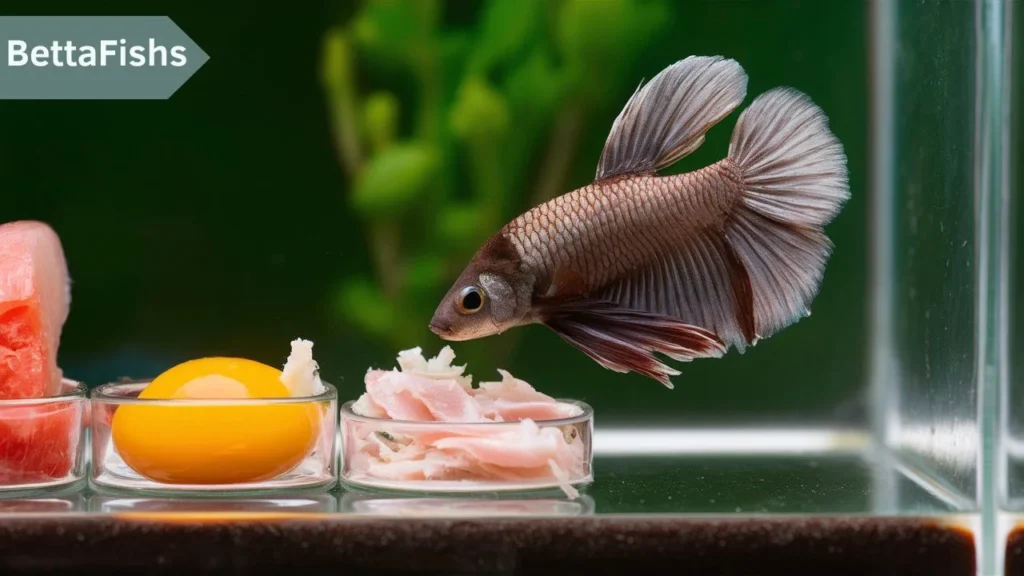
Benefits of Feeding Human Food
Variety in Diet
Offering human food can add variety to your betta’s diet, keeping them interested and engaged during feeding time.
Better Nutrition in Some Cases
Certain human foods, when given in moderation, can provide nutrients that may be missing from their regular diet.
Common Mistakes to Avoid
Feeding Too Much
It’s easy to overfeed when offering human food, so stick to small portions and limit the frequency.
Ignoring Nutritional Content
Not all human foods are created equal. Be mindful of what you’re feeding and ensure it’s beneficial for your betta.
Conclusion
Betta fish can eat some human foods, but it’s important to choose wisely and feed in moderation. Stick to safe options like vegetables, fruits, and lean proteins, and always monitor your betta’s reaction to new foods. By offering a varied diet, you can keep your betta happy, healthy, and thriving.
FAQs
Can Betta Fish Eat Bread?
No, bread is not suitable for betta fish. It can cause bloating and digestive issues.
How Often Should I Feed Human Food to My Betta?
Human food should be given as an occasional treat, no more than once or twice a week.
What Happens If My Betta Fish Eats Something It Shouldn’t?
If your betta eats something it shouldn’t, monitor them closely for signs of distress and consult a vet if necessary.
Can Human Food Replace Betta Fish Pellets?
No, human food should not replace specially formulated betta pellets, which provide balanced nutrition.
5. How Can I Tell If My Betta Fish Likes a New Food?
If your betta eagerly eats the food and shows no signs of distress afterward, it’s a good indication they like it.


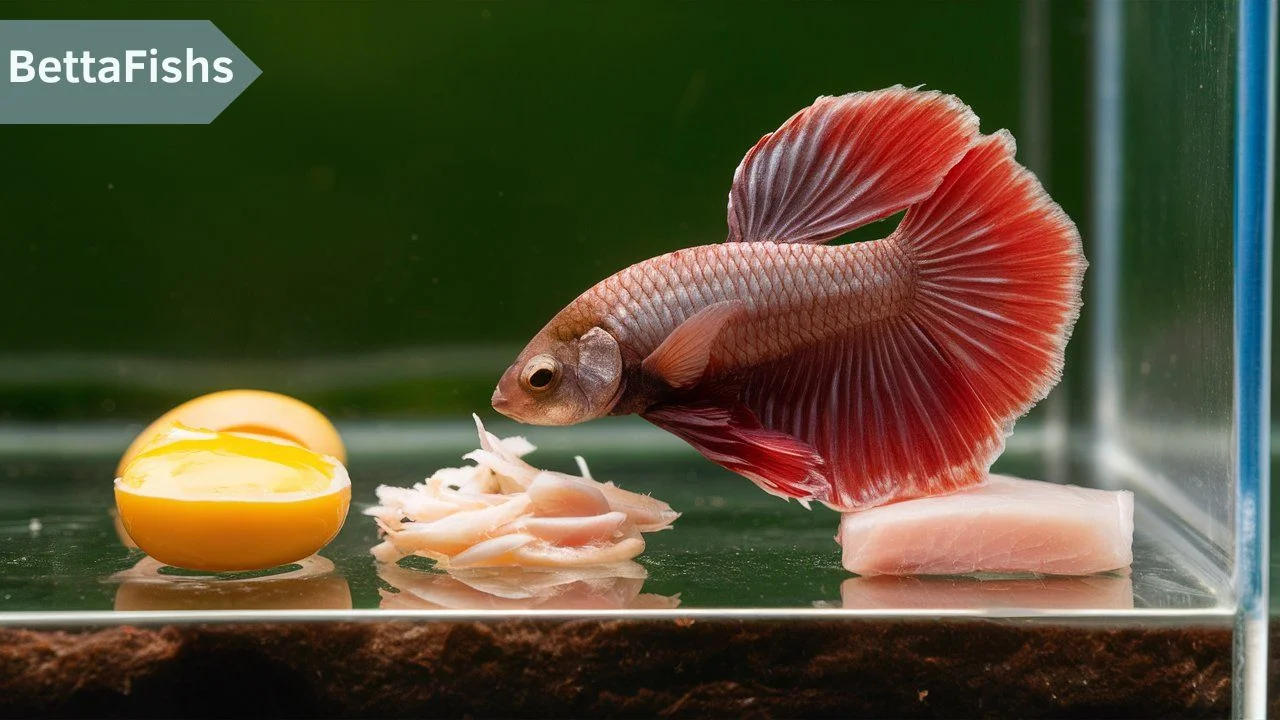
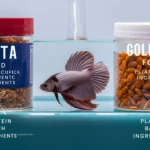
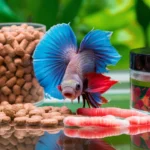
One Comment
Leave a ReplyOne Ping
Pingback:How long does a Betta fish live without food?